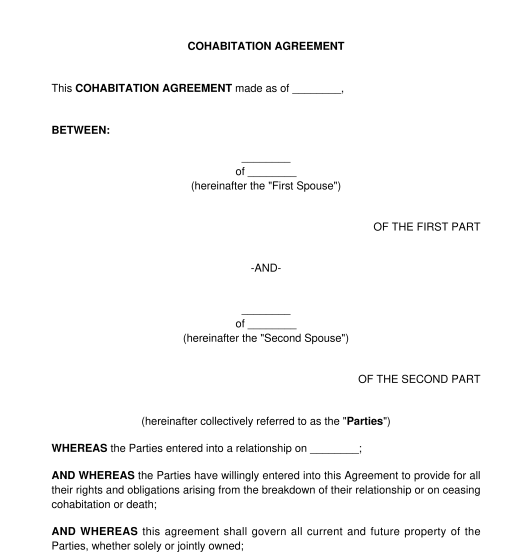 27/11/2025
27/11/2025

Answer a few questions and your document is created automatically.

Your document is ready! You will receive it in Word and PDF formats. You will be able to modify it.

 27/11/2025
27/11/2025
 Word and PDF
Word and PDF
 6 to 9 pages
6 to 9 pages
A Cohabitation Agreement is a contract that spouses enter into when they live together or plan on living together. The document is similar to a marriage contract, but it's meant for non-married spouses who wish to deal with their affairs in the event of a breakdown in the relationship. Upon marriage, this agreement turns into a marriage contract.
No. Having a cohabitation agreement is not necessary, but it's a useful agreement that allows the spouses to agree on important matters in the event of a breakdown in the relationship. A written agreement allows the spouses to enforce its terms in the event of non-compliance with what they agreed on.
A Cohabitation Agreement is used when spouses are entering into or are in a relationship. A Separation Agreement is used when the spouses haven't entered into a Cohabitation Agreement when they entered into a relationship, but want to deal with their affairs upon a breakdown in the relationship. Other than for child custody and parental responsibilities, a separation agreement will usually not be necessary if the spouses have signed a Cohabitation Agreement.
The agreement covers the following:
The right to property division depends on the law of the Province or Territory. The spouses may still agree on property division even if the law doesn't grant that right to non-married couples. In other words, if the spouses don't own the property jointly, they may still agree to an equal sharing of that property.
Depending on the Province or Territory, Cohabitation Agreements generally don't address parental responsibilities and child custody. That is reserved for Separation Agreements. It is illegal in the following Provinces/ Territories to have a clause on child custody and parental responsibilities:
Any attempt to include such clause will be invalid. This means that the clause can't be enforced by the spouses.
Only spouses in a relationship that aren't married may enter into a cohabitation agreement. It's important to note that the signatories must be of the age of majority and not under a disability. The ages of majority are as follows:
A cohabitation agreement typically lasts indefinitely to allow the spouses to enforce their rights and obligations as they relate to the agreement. In the event changes need to be made, the spouses can amend the contract accordingly. The agreement also converts into a marriage contract, which means it will last as long as the spouses don't terminate it.
The cohabitation agreement is only enforceable if the following requirements are met:
Once the cohabitation agreement is ready, it must be signed, and the spouses must start implementing its terms. The spouses will need to work together to disclose their assets and liabilities to each other and decide how they would like to outline their financial support and obligations towards each other and the children, if any. Assets (property) and liabilities (debts) is a list containing sources of income, employment benefits such as a dental plan, bank accounts, land, vehicles, and more.
Signed copies of the document should be kept in a safe and secure location such as a safe, bank safety deposit box, or with a lawyer. The spouses should also scan and upload the signed document to a personal computer.
If circumstances change, such as a change in the financial position of one of the spouses, they can sign an amendment to the Agreement to make such changes.
Yes. A cohabitation agreement requires witnesses in order to be valid. Each signing spouse should have an independent witness to their signature. In other words, there should be two witnesses. The witnesses must be of majority age.
If the document is not witnessed, it can be found invalid.
Cohabitation Agreements are a type of domestic contract which is governed by the law of each Province and Territory. The pieces of provincial and territorial family legislation are the following:
You fill out a form. The document is created before your eyes as you respond to the questions.
At the end, you receive it in Word and PDF formats. You can modify it and reuse it.
Cohabitation Agreement - Template - Word & PDF
Country: Canada (English)